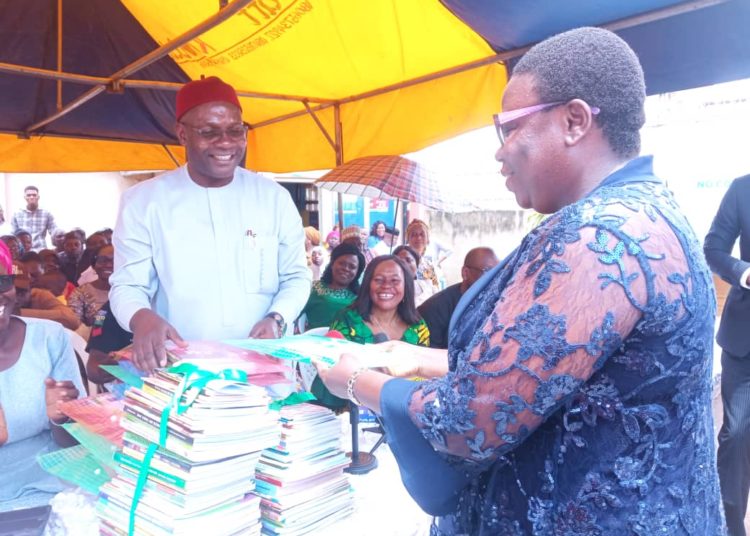Chief Executive Officer (CEO) of the National Library of Nigeria (NLN), Professor Chinese Anunobi has urged Nigerian authorities to empower the national library of it wants literacy efforts in the nation to succeed.
The chief librarian who spoke at an International Literacy Day programme funded by the United States Agency for International Development (USAID) LEARN To Read programme, in collaboration with the National Library of Nigeria (NLN), Reading Association of Nigeria (RAN), and the National Institute for Nigerian Languages (NINLAN), at Knocs N100 A Day School, Kuje, said that without literacy there would be no inclusivity and self-actualisation.
A UNESCO report indicates that of the 60.7 million out-of-school children in the globe, 20 million are Nigerians. National Bureau of Statistics (NBS) rates number of out-of-school children on Nigeria at 10 million; while the Minister of State for Education, Hon Goodluck Nana Opiah said about 71 million adults (31% of the country’s population) cannot read or write.
Lamenting the low level of awareness of the importance of literacy, reading and libraries in the Nigerian society, Anunobi said efforts to engage corporate organisations in literacy programmes has proven futile.
“When we approach organisations with corporate social responsibility funding they don’t seem to appreciate the need for reading and literacy campaign.
“The funding we get as a library is appalling. There are many organisations and NGOs that when you provide structure and a little funding, they pick up from there. But the national library does not have the wings. It is when we have the wings, that we can combine theirs and ours to fly. That is the only way that we can defeat illiteracy.”
The don also bewailed the apex library’s short staffing noting it has just 520 to service it’s 33 branches across the country.
Hence, efforts such as that of the Knocs N100 A Day School, Kuje which provides access to quality, affordable education in line with the 2022 International Literacy Day theme Transforming Literacy Learning Spaces should be commended.
In addition to the library’s donation of stacks of books (literature and literary texts) and reading tablets, its partners at the event donated writing materials and curriculum texts to the school, in addition to four copies of LEARN To Read programme in Yoruba, Hausa, Igbo and Pidgin languages to the school.
Speaking at the event, co-founder of Knocs School, Kingsley Bangwell said literacy, which is the ability to read and write, aid in the improvement and development of the intellectual capacity of people, particularly young people on whose abilities the nation depends on for development.
In spite of the many challenges against literacy in Nigeria, including poor budgetary allocation, 18.5 million out-of-school children, inadequate infrastructure and funding, Knocs School, Bangwell said, continues to provide access to quality education at little to zero cost; depending on the generous donations of organizations and Nigerians.
By paying N100 per day at the school, children get school uniform, books, lunch and (pads for young girls). At N100 A Day, that equals to N6,000 per term (three to four months) a paltry sum compared to the more feasible tuition fees of N66,000 the children would have paid.
To strengthen its sustainability, the school targets the operation of a school farm, and a waste recycling services in the Kuje area as means of generating revenue to buy a land and build its own facilities .
Currently, about 80 students are enrolled in the school, and 30 more scheduled to enroll this school year.
“We are encouraging government with what they are doing, and saying it needs to do a lot more to ensure that no child or citizen is left out of the literacy bracket,” said Bangwell.
Meantime, representative of the USAID’s LEARN To Read programme, highlighted the importance of indigenous languages in the fostering of literacy, especially for early years readers.
He called for improvement of literacy skills at the community level through reading hubs, accessibility of age and grade appropriate materials, and catching children young, as a key means to “Transforming Literacy Learning Spaces’.
With the support of LEARN To Read, the national library in its 2022 Reading Campaign is focused at improving literacy level in remote areas, via the use of indigenous texts and literature.
“We are encouraging people to speak and read in their mother tongue. The LEARN to Read programme have given us four books written in Yoruba, Hausa, Igbo and Pidgin.
“We are going to the communities to provide them smart bots, indigenous literature, writing materials. The chief of the community will get us a volunteer, it could be a corps member or anyone from the village that can begin to teach people, so that they will begin to learn the alphabets. We want them to understand that reading and writing is not just about learning a foreign language rather it is about learning to inscribe in their own language; it is about learning to express themselves in their own language,” concluded Anunobi.





